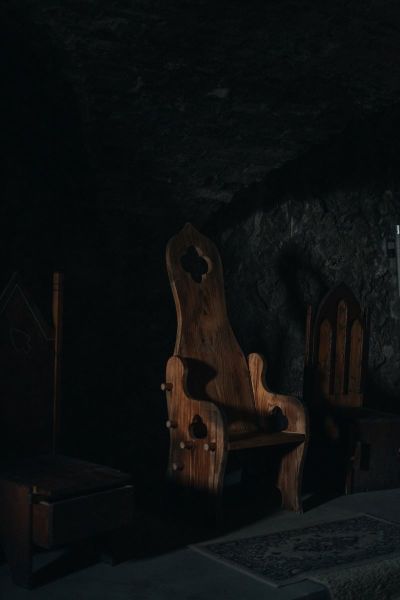Revelation 16: The Antichrist’s throne, darkness and the inevitable downfall

Author, political activist, and lecturer, Helen Keller once said, “I have often been asked, ‘Do you believe in the supernatural?’ I have said firmly that I do not. But I do believe in atmospheres. An inexplicable chill envelopes me when darkness falls.” Coming from someone who was both deaf and blind, Keller’s statement is a powerful testimony to the way darkness is a formidable force that instills fear deep within, and its presence can even be palpable at times.
One event in recent history that encompassed the elements of darkness, fear, confusion and chaos was the Great Blackout of 1977 in New York City. On a hot July evening, a widespread power outage plunged the entire city into literal darkness.
The dominating presence of darkness during those evening hours was inherently unsettling. As the lights flickered out one by one, it created a pervasive sense of isolation and vulnerability. The towering skyscrapers that defined the city skyline were reduced to anonymous silhouettes against a pitch-black backdrop. Streets typically bustling with activity became desolate and eerie, casting long shadows that would play tricks on the mind.
The initial moments of the blackout fostered disorientation and disorder. Traffic lights went out, causing major gridlock on the roads, and resulting in almost immediate car wreaks. Subway trains came to a halt, leaving commuters stranded in dark tunnels. Elevators no longer functioned, trapping people between floors, and nurturing a sense of helplessness.
As the blackout continued, fear seeped into the hearts of New Yorkers. Anxiety quickly spread as rumors about the cause of the blackout circulated. There were reports of looting and violence that escalated the sense of insecurity. With emergency services severely strained and communication systems disrupted, reliable information was scarce, leaving many in a state of complete disarray.
Although the darkness only lasted for approximately 25 hours, it left an indelible mark on the collective human experience, showing us how the absence of light evokes deep-seated emotions of fear, muddling, and mayhem, that can grip even a sprawling metropolis like New York which is always brimming with energy.
In Revelation, chapter 16, verses 10 through 11, the Word of God portrays a haunting image of darkness enveloping the seat of the Beast’s worldwide government. Here’s what it says:
“Then the fifth angel poured out his bowl on the throne of the beast, and his kingdom was plunged into darkness. His subjects ground their teeth in anguish, and they cursed the God of Heaven for their pains and sores. But they did not repent of their evil deeds and turn to God” (Revelation 16:10-11).
The prophet Joel foretold of this time, saying it would be “a day of darkness and gloom, a day of thick clouds and deep blackness” (Joel 2:1-2). Jesus also spoke of this time, saying, “At that time, after the anguish of those days, the sun will be darkened, the moon will give no light” (Mark 13:24).
Picture a scene where daylight is abruptly replaced by a comprehensive covering of blackness and misery. The usual radiance and clarity associated with a seat of power are suddenly extinguished, leaving its environs plunged into impenetrable shadows. This darkness, though real, serves as a profound symbol of the divine judgment and impending downfall that awaits those who oppose righteousness and wield authority unjustly.
As the darkness descends upon the throne of the Beast, it depicts the moral bankruptcy and corruption that prevail in his regime. It signifies the loss of enlightenment, truth, and virtuous instruction, leading to confusion, deception, and turmoil. This once visible, powerful, and supreme seat of earthly authority becomes shrouded by a cloak of concealment.
The late Jack Van Impe in his commentary, Revelation Revealed, says:
“Whatever the darkness is, we take it to be literal as was the Egyptian plague described in Exodus 10:21-23.” That text reads:
“Then the Lord said to Moses, ‘Lift your hand toward Heaven, and the land of Egypt will be covered with a darkness so thick you can feel it.’ So, Moses lifted his hand to the sky, and a deep darkness covered the entire land of Egypt for three days. During all that time the people could not see each other, and no one moved. But there was light as usual where the people of Israel lived” (Exodus 10:21-23).
In his book Exploring Revelation, John Phillips has written:
“Since men have chosen the powers of darkness as their spiritual guides and have scorned the Light of the world [Jesus Christ], God gives them what they want — darkness, thick darkness, a darkness like that of Egypt, which could be felt. It is a foretaste of that ‘blackness of darkness forever’ (Jude 13) which will be the eternal lot of these evil ones.”
Jesus talked about the Judgment to come and people being thrown into a place of “outer darkness” and a “fiery furnace” (Matthew 8:12; 13:42; 13:50; 25:30, 41).
Some people have difficulty reconciling the contrasting images of darkness and fire. They ask how can there be both in the same place if the texts are meant to be taken literally. Fire is the source of light. How can Hell be a place of “outer darkness” as the Bible describes, if intense fire burns there, which would naturally provide light?”
Some scholars would propose the images of darkness and fire in hell are metaphorical and simply symbolize different aspects of punishment or separation from God. Darkness represents the absence of God’s presence or a spiritual void, they would say, while fire symbolizes the destructive and refining nature of God’s judgment.
Such explanations, however, do not do justice to the texts. A better interpretation would seem to be that the Bible is using paradoxical language to emphasize the incomprehensibility of hell. Fire and darkness are contrasting images that together underscore the unimaginable and indescribable nature of the eternal state of punishment. In other words, darkness and fire exist simultaneously and represent the inconceivable nature of being condemned forever in a place where God, nor His love, nor His goodness, nor His many gifts, exist. There is no happiness or joy there, no meaningful relationships, no kindness, no pleasures of any kind, only inexpressible pain, anguish, and suffering that is other-worldly. It is a place where its inhabitants burn but they don’t burn up. The condemned dwell in a depth of darkness so tangible, it seeps into their very core.
Imagine the darkest of nights, devoid of any stars or moonlight, combined with an eternal vacuum of emptiness that evokes a primordial fear, an instinctual terror that cannot be understood nor overtaken. It is an all-encompassing darkness that seems to mock the very notion of hope, extinguishing every flicker of light or belief in something better tomorrow.
The Scripture says that this darkness befalls the seat, or the throne of the Beast, the Antichrist. The Bible does not make it clear the exact location of the Antichrist’s seat of power. Many claims have been made, but apparently, the Scriptures have purposely left this matter a mystery for now.
Some believe the darkness described in Revelation 16: 10-11 is worldwide, while others think it’s limited to the capital of the Antichrist.
Dr. Henry Morris, in The Revelation Record, asserts that whatever the extent of the Antichrist’s kingdom at that time, distinct from all the kingdoms of the world over which he has gained control, “the darkness surely will center particularly upon the capital city. It may extend somewhat further, but the context makes it unlikely that it will extend throughout the world.”
Morris adds:
“In any case, it will constitute one more, very powerful, evidence that God is still God; the reign of the Beast is outwardly impressive and global in extent but will soon be forgotten when Christ finally establishes his kingdom on earth.”
When God’s judgment of darkness fell upon Egypt, the book of Exodus says there was light everywhere that God’s people lived. God will protect and provide for his own as it serves his purposes. God has not appointed his children to wrath (I Thessalonians 5:9).
This is important because the book of Revelation was written primarily to uplift and encourage those of faith who were enduring great bouts of persecution. Revelation 16:10-11 provides an immensely exhilarating word for believers of every age, but most especially for believers in the last days, who go through the Tribulation. It’s a word that promises every oppressed child of God under wicked rule, shall ultimately see the humiliation of those who direct the masses under the influence of the Evil One. They will see the mighty power of God unleashed upon their authority. Darkness, a terrible, terrible darkness will come upon even the most diabolical leader and his or her administration. Doxology!!!
The bowl judgments prophesied in Revelation chapter 16 seem to move quickly in succession, consistent with something Jesus predicted about the end times. He said these events would take place like a woman’s labor pains which begin rather slowly but increase rapidly toward the end (Matthew 24:8).
Clarence Larkin in The Book of Revelation has penned:
“Notice that this Plague [Darkness] immediately follows the Plague of ‘Scorching Heat,’ as if God in his mercy would hide the Sun whose rays had been too hard to bear. The effect of the darkness was to make men gnaw their tongues [as it reads in some translations] for pain and their sores, showing that these plagues overlapped each other, or followed in such rapid order that they were not over the sufferings of one before they were suffering from another and that they were limited to a short period of a few months, and not distributed over a few years…”
But note the response by those enveloped in the darkness, even after the affliction of odious sores, the waters made vile, a fiery climate, and now a dense darkness. Through the worst of pain, they are not humbled, nor do they turn from their sins, but they blaspheme God.
To blaspheme means to show irreverence and disrespect for God. It involves showing contempt, dishonoring, or insulting him. Blasphemy can take on various forms, such as using profane derogatory language, mocking God and His order, or intentionally desecrating what is holy.
There is a common misconception that hitting rock bottom is a prerequisite for recovery from drugs, alcohol, and other addictions. Many often hit rock bottom, but still never recover.
My wife’s brother had serious addiction issues to drugs and alcohol. We did everything within our power to help him break free. We took him into our home. We loved him, shared the Gospel with him, and prayed for him. We even made a down payment on a house to get him on his feet. In the end, he only cursed us for getting in the way of his unceasing pursuit of intoxicants. Eventually, after burning all his bridges and living under a bridge in Raleigh, one dark night he fell into a swift creek after a heavy rain while drunk and drowned.
The National Epidemiologic Survey on Alcohol and Related Conditions (NESARC 2001-2002), a large-scale survey in the United States, found that among individuals with alcohol dependence, only about 25% achieved sustained recovery. The National Institute on Alcohol Abuse (NIAAA) Longitudinal Study, a study that tracked the long-term recovery outcomes of individuals with alcohol dependence, showed that only about one-third were abstinent after 16 years, and the overall probability of maintaining recovery decreased over time. Research on gambling addiction also suggests the same. A study published in the Journal of Gambling Studies found that of the individuals who sought treatment for gambling disorders, only 10.3% were considered “recovered” at a two-year follow-up.
The point here is not that deliverance isn’t possible. However, no matter how badly some people suffer, though they should have long learned the lesson of the futility of their behavior, they press on unrepentant.
To a large degree, whatever the hardship or the misery produces depends on the nature of a person’s heart. Heat will melt butter, but it will harden clay.
Dr. H. A. Ironside in his Lectures on Revelation, sums the question up very succinctly, saying:
“Darkness and anguish do not tend to soften men’s hearts or to lead them to confess their sins. Their very suffering but stirs them up to blaspheme God the more. And so, in the outer darkness of a lost eternity, our Lord has told us there shall not only be weeping and wailing because of suffering endured, but there will be the gnashing of teeth, which implies rage and indignation against God. With permanency of character, he who rejects Christ is guilty of eternal sin, and eternal punishment necessarily follows.”
If you have never repented of your sins and given your life to Christ, then consider these invitations found in the Bible:
“Jesus spoke to the people once more and said, ‘I am the light of the world. If you follow me, you won’t have to walk in darkness, because you will have the light that leads to life’” (John 8:12).
“Yes, I am sending you to the Gentiles to open their eyes, so they may turn from darkness to light and from the power of Satan to God. Then they will receive forgiveness for their sins and be given a place among God’s people, who are set apart by faith in me” (Acts 26:17-18).
“For he has rescued us from the kingdom of darkness and transferred us into the Kingdom of his dear Son, who purchased our freedom and forgave our sins” (Colossians 1:13-14).
“For once, you were full of darkness, but now you have light from the Lord. So, live as people of light!” (Ephesians 5:8).
Believe in the good news of Christ with your whole heart and come into the light while you still can.
Rev. Mark H. Creech is Executive Director of the Christian Action League of North Carolina, Inc. He was a pastor for twenty years before taking this position, having served five different Southern Baptist churches in North Carolina and one Independent Baptist in upstate New York.



























